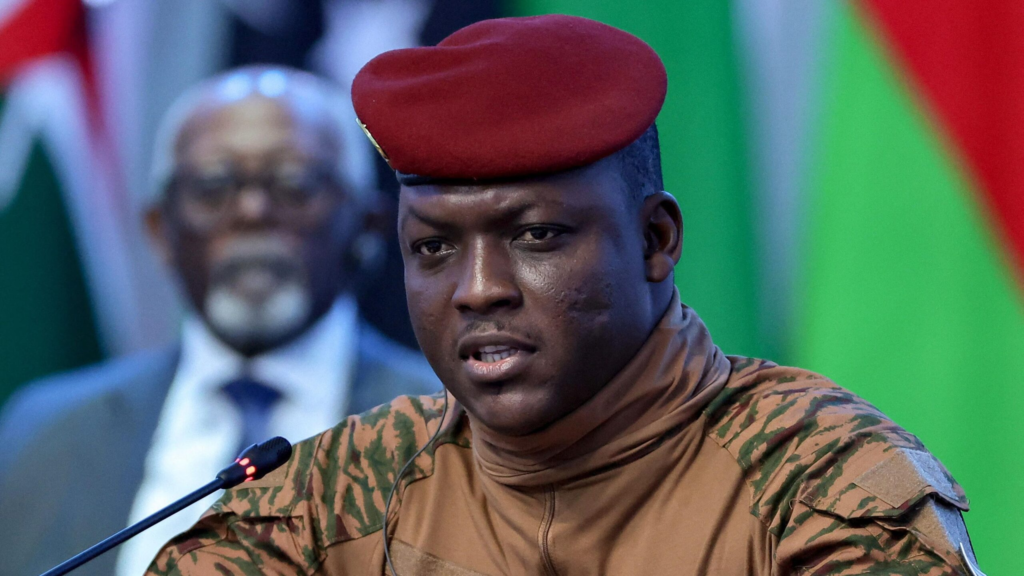The West African nation of Burkina Faso finds itself amidst another political shift as military ruler Capt. Ibrahim Traoré dismisses Prime Minister Apollinaire Joachim Kyelem de Tambela and dissolves the government.
This move, emblematic of the broader political turbulence in the Sahel region, highlights the growing trend of military-dominated governance in nations grappling with security challenges and insurgent threats.
Political Uncertainty Amid Governance Changes
Burkina Faso has seen dramatic political transformations in recent years, with military coups altering the trajectory of governance. Capt. Ibrahim Traoré’s decision to sack Prime Minister Tambela and his cabinet reflects the fluid and unpredictable nature of the nation’s leadership.
Tambela, a civilian leader, was appointed as prime minister in 2022 shortly after Traoré seized power in a coup. His role was seen as a civilian bridge in a government led by the military.
The dismissal decree did not offer explicit reasons for the decision, sparking speculation about internal discord or dissatisfaction with the prime minister’s performance.
Read : 600 People Shot Dead Within Hours by Al-Qaeda in Burkina Faso
Tambela’s government was dissolved, but its members were instructed to remain in office until a new cabinet is formed, leaving the nation in a state of governance limbo.
Read : 21 Soldiers Killed in Ambush by Unidentified Terrorist Group in Niger
Burkina Faso’s political upheavals mirror similar patterns in neighboring Mali, where military leaders have also dismissed civilian prime ministers to consolidate power.
The dismissal of Tambela raises questions about whether Capt. Traoré intends to follow Mali’s example by appointing a military official as prime minister. Such a move could tighten the junta’s control over the country while sidelining civilian voices in governance.
The Security Challenge in Burkina Faso
Burkina Faso’s political instability is deeply intertwined with its ongoing security crisis. Like other Sahelian nations, the country is grappling with persistent threats from jihadist groups linked to al-Qaeda and the Islamic State. These groups have conducted frequent attacks, displacing millions and destabilizing communities across the region.
When Capt. Traoré assumed power, his junta promised to prioritize security and restore stability. However, the situation remains dire, with insurgent activities continuing unabated. The military’s inability to curb these threats has fueled dissatisfaction among the populace and strained the nation’s governance structures.

The dismissal of Tambela comes against this backdrop of insecurity. It raises concerns about whether the political shifts are genuine efforts to address the crisis or mere tactics to prolong military dominance.
As attacks persist, the government’s focus on consolidating power instead of prioritizing comprehensive security strategies may exacerbate public frustration.
Observers have noted that Burkina Faso’s reliance on military-led governance has done little to resolve its security issues. The nation remains at a crossroads, where sustainable peace depends on cohesive leadership, inclusive governance, and effective strategies to combat insurgencies.
Implications for Democracy and Civilian Rule
The removal of Prime Minister Tambela and the dissolution of the government underline growing apprehensions about the military’s intentions in Burkina Faso.
While the junta initially justified its takeover as a necessary step to restore order and security, its actions increasingly suggest an unwillingness to cede power.
There is a broader concern that junta leaders in the Sahel region, including Burkina Faso, Mali, and Niger, are deliberately delaying democratic transitions.
Elections that were promised to restore civilian governance have been postponed, fueling skepticism about the military’s commitment to democracy.
In Burkina Faso, the absence of clear timelines for elections and the continued dominance of the military raise questions about the future of democratic governance. The dismissal of Tambela, a civilian leader, further diminishes the prospect of civilian participation in the country’s leadership.

International observers have expressed concerns about the erosion of democratic norms in the Sahel. Burkina Faso’s trajectory mirrors a regional pattern where military regimes prioritize power consolidation over democratic accountability. This trend risks alienating international partners and undermining efforts to address the region’s complex challenges.
Burkina Faso’s political and security crises demand a coordinated and inclusive approach. While the military’s focus on countering insurgencies is crucial, it must be complemented by efforts to restore civilian governance, rebuild trust, and address the root causes of instability.
Capt. Traoré’s next steps will be closely watched, both domestically and internationally. The formation of a new government and the appointment of a new prime minister will provide insights into the junta’s intentions.
If the new leadership prioritizes inclusive governance and security reforms, it could pave the way for a more stable Burkina Faso. However, if the junta continues to prioritize power retention over meaningful change, the nation risks prolonged instability and international isolation.
In a region marked by fragility and conflict, Burkina Faso’s choices will have implications beyond its borders. The nation’s ability to navigate its current challenges could set a precedent for the Sahel and influence broader efforts to address governance and security issues in the region.

